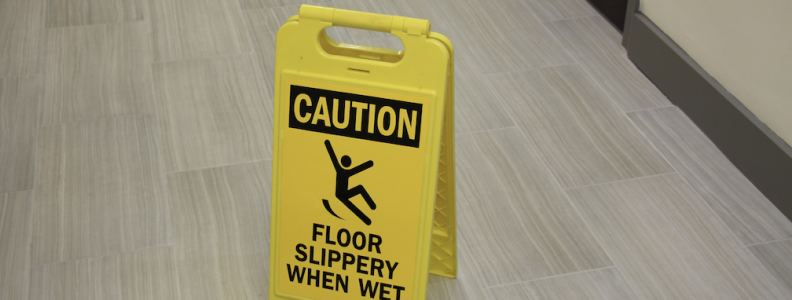
What Does It Take to Win Your Slip and Fall Airport Injury Case?

Airline pilots and flight crew encounter all sorts of hazards on the ground in between trips. However, as a recent opinion by Federal Court judge Norman Moon makes clear, under Virginia law, an injured slip and fall victim MUST prove not only that they were injured by something dangerous on the floor, but also that the owner of the place KNEW or SHOULD HAVE KNOWN of the danger in time to have prevented the harm.
In a recent Virginia slip and fall case, the Defendant, Walmart, sought summary judgment against a woman who fell at their store at the self-checkout scanner. After falling, the injured customer noticed a greasy spot on her pants. According to a Virginia Lawyers Weekly report of the case, a Walmart employee came over from a nearby kiosk and made a statement that a previous customer was eating chicken at the self-checkout scanner. The employee then wiped up a 4-5 inch undisturbed puddle of what the injured patron inferred was chicken grease.
In court, the lawyer for the customer did not argue that Walmart had actual notice of the hazard on the floor. So, according to the Federal court, in order to establish premises liability she must prove constructive notice of the chicken grease, i.e. that the condition existed for a sufficient length of time to charge the owner with notice of it. But Plaintiff’s counsel also conceded that one cannot tell from the evidence how long the chicken grease was on the floor. The judge found that this was fatal to her case. All the court knew was that the Walmart employee stated that another customer was eating chicken in the area at some unspecified “earlier” time.
This bare “hazard-then-fall sequence” was insufficient to prove constructive notice. It was as logical to assume that the chicken grease was on the floor only moments before the plaintiff shopper’s fall as it is to infer that it had been there long enough that Walmart should have known about it. The plaintiff in most injury cases has the “burden of proof,” so the injured person’s counsel must put on evidence as to how long the dangerous liquid was on the floor. The case described above was Diggs v. Wal-Mart Stores Inc., Case No. 6:17cv26, decided Mar. 8, 2018 by the United States District Court for the Western District of Virginia at Lynchburg. Note that this case has nothing to do with the law firm of Abrams Landau, Ltd.
Finding that the customer had no negligence claim, Judge Moon ruled that the Defendants were entitled to summary judgment. In other words, the injured woman’s case was dismissed before it ever got near a trial by jury. Likewise, if an airline captain or member of a flight crew slipped and fell at the airport on grease, liquid, oil, potato chips or other spilled or leaked substance, the injured plaintiff would have to put on evidence that either:
- • the airport or shop KNEW of the hazard (because of prior complaints, seeing the hazard, statements by employees, etc.), or
- • the puddle was there for such a long time that the airport or terminal shop should have seen or perceived of the danger in time to clean it up or warn about it.
Lawyer Doug Landau of the Herndon law firm Abrams Landau, Ltd. notes, “if other crew members saw the puddle, leak or other dangerous condition and complained to the store owner or airport authorities BEFORE the plaintiff was injured, that evidence may be used to prove ‘Notice.’ On the other hand, if an airport traveler knocked something over just moments before the airline captain, co-pilot or flight crew member slipped and fell, then under Virginia law, the injured aviator may have a hard time winning their case in court.”
As this kind of evidence disappears quickly, and witnesses’ identities in airport cases are hard to track down, it is imperative to contact an experienced airport injury lawyer. Sometimes surveillance videos can capture the accident. Other times, statements by employees and airport investigators can help to establish the responsibility of the terminal store that caused or allowed the dangerous, slippery condition to exist.
If you or someone you know or care for has been injured as the result of an airport terminal, airplane or other air travel related accident and there are questions about what laws apply, e-mail or call us at ABRAMS LANDAU, Ltd. (703-796-9555) at once.
